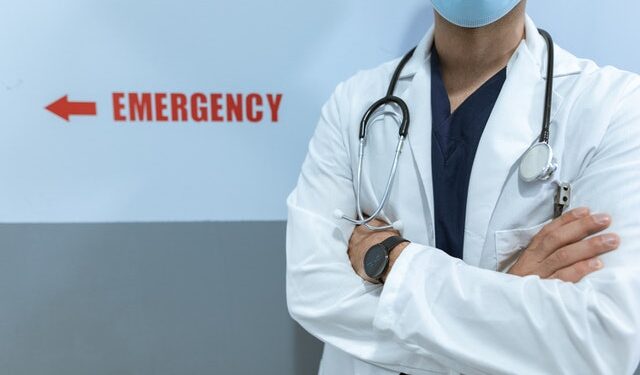
Doctors are the worst patients. Physicians are sick, and it’s getting worse. Yet too few physicians seek help when we are struggling. Record numbers of us are burning out, becoming mentally ill or addicted, retiring early, and leaving medicine. This article explores the barriers to physicians seeking help and looks for potential solutions.
A shocking, but rarely talked about fact is that 300-400 of us end our lives through suicide — a rate approximately double that of the general population. Female physicians are at higher risk still.
Reasons for this are as complex as we are, but a look at the literature gives us some pointers.
First, let’s look at the data. During COVID, the 2021 Medscape Physician Report – “Death by 1,000 cuts” of some 12,000 colleagues reported alarming (intra-COVID) statistics:
... fears of professional consequences... limited time ... stigma ...
Why don’t a group like doctors with our education, intelligence, work ethic, and motivation seek help enough? Stigma is a major obstacle especially for doctors seeking psychiatric treatment. One 2016 study found 50% of female doctors who completed a Facebook questionnaire reported meeting criteria for a mental disorder but were reluctant to seek professional help because of the fear of stigma.
Based on our experience and a scan of the literature, the most commonly cited reasons for physicians not seeking help are:
Sometimes, we just don’t help ourselves. Leading light in the physician wellbeing space, Dr Tate Shanafelt MD describes the “Physician personality” as conscientious and guilty, with an exaggerated sense of personal responsibility.
He describes an Impostor Syndrome common to physicians: “Many are waiting to be discovered as the fraud they think they are, so they stay quiet about their doubts and insecurities.”
Furthermore, many of us have “survival mentality” starting at (or before) med school: “I’ve just got to make it through,” physicians think. “Things will get better when I’m done with residency.”
Many are waiting to be discovered as the fraud they think they are, so they stay quiet about their doubts and insecurities.
However, physicians continue to perpetuate that same “things will get better when” framework throughout their entire careers.
For example, Dr Shanafelt said, one study found that 37 percent of physicians reported looking forward to retirement as an effective strategy for well-being. This is a physician’s survival mentality of work now — then retire and get a personal life.
Talk about work-work balance.
In a complex system like ours, what can be done proactively to prevent physician burnout, mental illness, addiction, and (God forbid) suicide?
How can we build a system that protects physicians so that they don’t end up a gaping hole in the lives of their loved ones and patients, never mind a gap in the service rota?
As a recovering physician, experience has shown me that these are the key points to address:
We need to normalize physicians as human beings first, and professionals second.
What if there was a completely anonymous safe space for registered physicians to get together and share in confidence?
Share our pain and our triumph
Our self-doubt and regret.
Our mistakes and successes.
Our vulnerability.
Our humanity.
By ensuring anonymity, we hope that physicians and medical students of all levels and specialties, feel safe to talk.
And listen.
What if there was a completely anonymous safe space for registered physicians to get together and share in confidence?
To address these fears, especially those of professional consequences, we believe that safe spaces are necessary. Safe spaces where we can speak honestly without fear of repercussions, and those listening will hear us and feel for us. For physicians to truly benefit we believe anonymity is essential in professional wellbeing support spaces.
There will be no narcissistic raging Dr Gregory Houses (“You know what’s worse than useless? Useless and oblivious”), or Dr Bob Kelsoes (“Do you not realize that you’re nothing but a large pair of scrubs to me?”) – (evidence that art does, in fact, imitate life) to bully/abuse/shout at/humiliate/abuse/fire us.
There will be no clipboards, audits, inspections. There will be no medical school deans, exams, or State Licensing Boards.
There are no hierarchies. Our professional status, income, place of work, and specialty are not important. We are all just humans on the bus who happen to be physicians.
Fellow physicians supporting each other as equals.
Gossip leads to distrust. There has to be 100% anonymity for us to feel safe to share and for this program to succeed. We wish it were not so.
Anonymity is the cornerstone of such a safe space. Without it, people won’t share what’s truly going on, and the people listening won’t hear the real truth.
It is in the truth of our humanity that we find connection and healing.
Gossip leads to distrust. There has to be 100% anonymity for us to feel safe to share and for this program to succeed. We wish it were not so.
Therefore, we take security very seriously.
Doctors supporting doctors is our way.
This article discusses some of the reasons why struggling physicians don’t seek help. These include fear of professional repercussions, stigma, and the so-called “physician personality”.
To overcome some of these barriers, we created Physicians Anonymous to offer a safe space for people to share and access professionally supported and facilitated peer support. In this way we hope the more doctors out there will become physicians unafraid to seek help.
If you would like to find out more, feel free to access our physician-only and completely anonymous peer-support groups.
